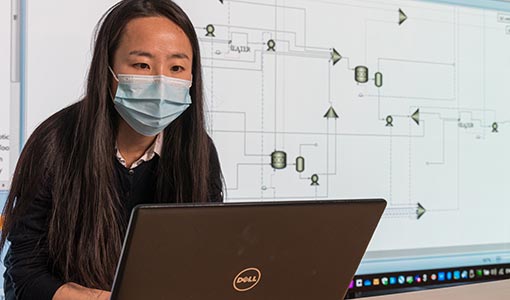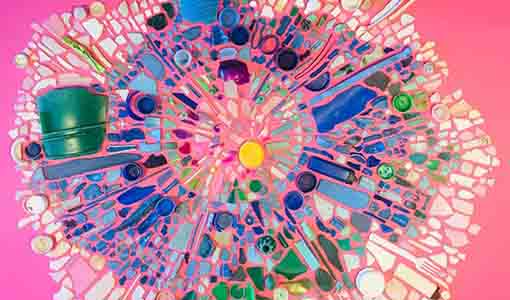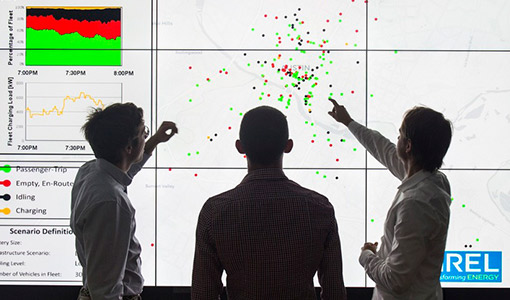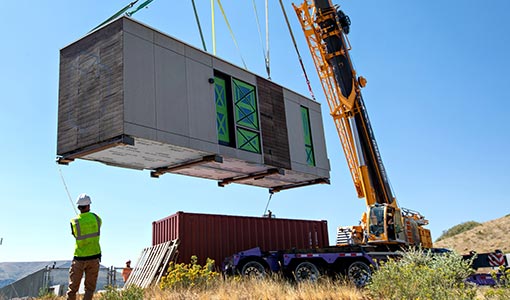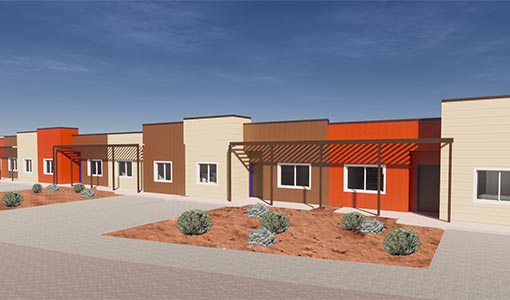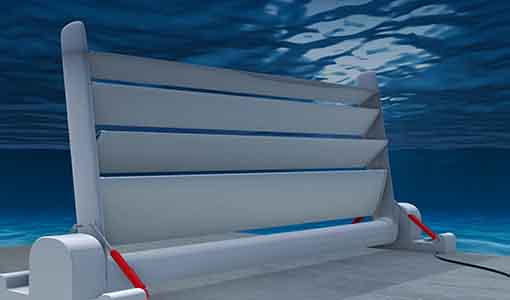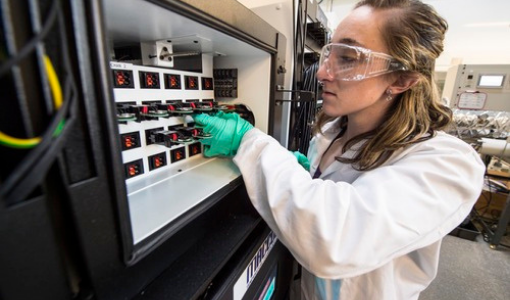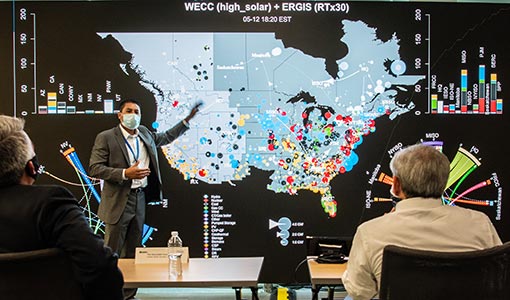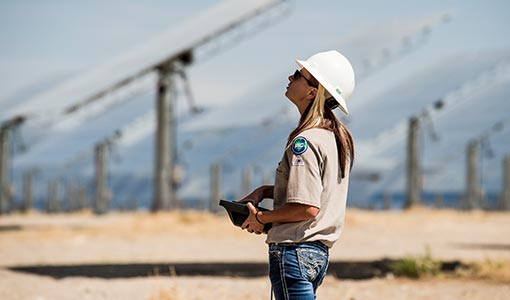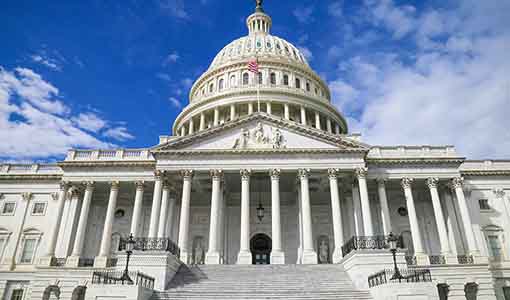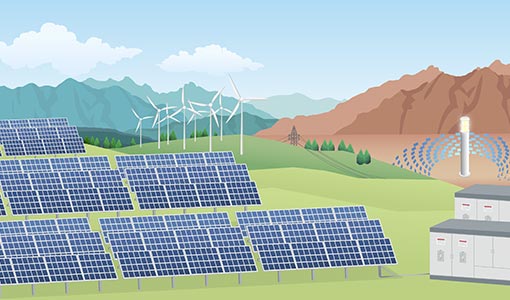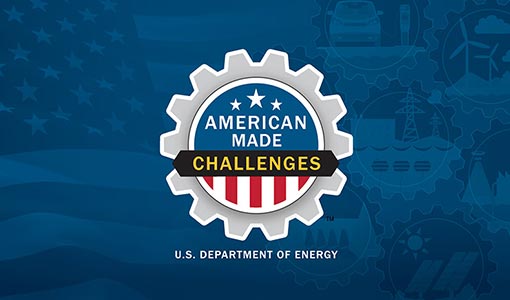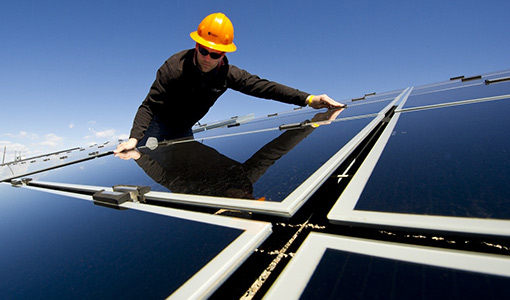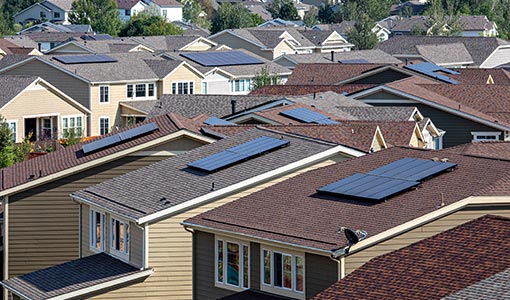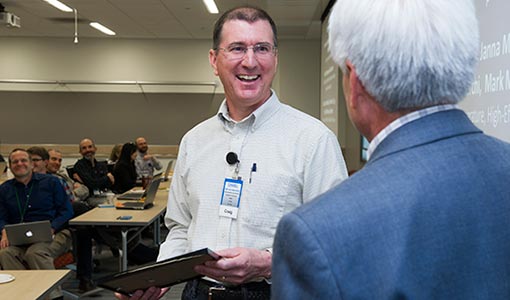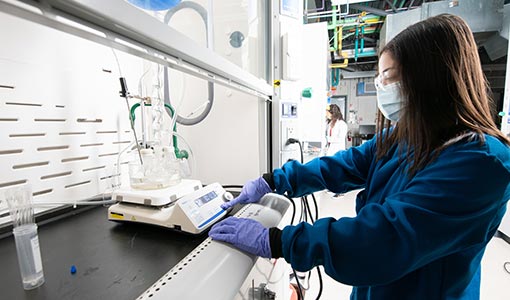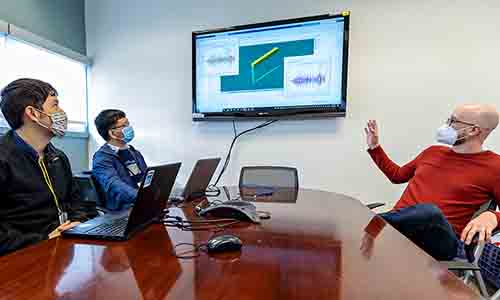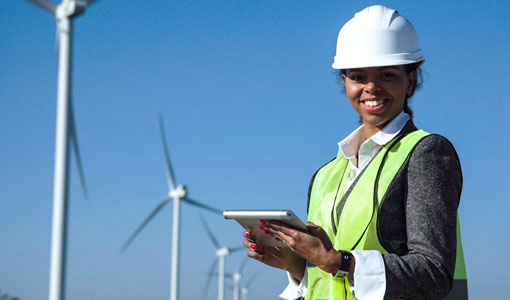February 2022
Beyond Fossil Carbon? Green Electricity Is Opening Doors to Low-Emission Alternatives for Making Fuels and Chemicals
Petroleum, coal, and natural gas are not the only starting points for making fuels and chemicals. In fact, growing supplies of renewable electricity open exciting new doors for making identical products at potentially a fraction of the climate cost.
Can We Fix Recycling?
Three NREL teams win prestigious REMADE awards to remake recycling, improve manufacturing, and build a circular economy.
Transportation Modeling Tool Informs Intelligent Planning and Control for Mobility-Service-Provider Fleets
The transportation industry is on the cusp of rapid evolution, with vehicle electrification, automation, and ride sharing transforming the age-old paradigm of privately owned and operated gasoline vehicles.
A Metabolic "Traffic Map": Machine Learning Lets Scientists Plot Complex Flow of Compounds Through Microbes
Like traffic signals controlling cars through the center of town, microorganisms use metabolic signals to control the flow of energy and nutrients.
Blok-by-Blok: Lower Emissions and Costs With Net-Zero Energy Modules
A new report from Blokable, the Wells Fargo Innovation Incubator (IN2), and the National Renewable Energy Laboratory (NREL) details actionable pathways to developing and building net zero energy (NZE) housing without increasing costs yet still reducing greenhouse gas (GHG) emissions. IN2 is managed by NREL's Innovation and Entrepreneurship Center.
Addressing Energy Challenges of Housing Health Care Professionals on Remote IHS and U.S. Tribal Lands
The Indian Health Service (IHS) serves 2.6 million American Indians and Alaska Natives annually on a mission to raise physical, mental, and spiritual health. One of the biggest hurdles is staffing.
A Window Into the Future of Wave Energy
Why aren't waves powering your home right now? The ocean is an inhospitable place for technology. Now, a new cost-effective, resilient wave energy design adapts to changing seas and could help power up the wave energy industry.
Contaminant Identification Refines Recycling for Lithium-Ion Batteries
As the predominant choice for high-powered personal electronics, electric vehicles, and grid-scale storage solutions, lithium-ion (Li-ion) batteries continue to dominate the marketplace. To meet clean energy goals of the future, researchers must develop safe and sustainable recycling processes for these batteries.
NREL and Pacific Northwest National Laboratory Demonstrate Multi-Lab Capabilities in Live Demonstration
We can currently link models and simulations across the national laboratory complex, but imagine connecting these models with equipment, devices, and scientists so they can work together as if side by side instead of thousands of miles apart.
Next-Gen Concentrating Solar Power Research Heats Up at NREL
Concentrating solar power (CSP) has long held promise as a renewable energy technology. CSP uses mirrors, or heliostats, to harness the power of the sun by heating and storing an inexpensive medium such as sand, rocks, or molten salt for on-demand energy dispatch.
NREL Hydropower Research Informs Discussions on Capitol Hill
On Jan. 11, 2022, U.S. senators and hydropower experts referenced NREL's hydropower research to argue for an expansion of the U.S. hydropower industry.
Building a Solar-Powered Future
The Solar Futures Study draws insights from across NREL's expertise and tools to deliver detailed analysis of solar energy's future in the United States.
Wood Next Fund Partners With American-Made Challenges Prize Competitors To Support Water Desalination Technology Innovations
Winning thousands in cash prizes is just one of the many benefits that comes with being a finalist in an American-Made Challenges (AMC) Prize competition.
Q&A With Jordan Cox: Expect the Unexpected With Resilient Systems
Planning for an unexpected event is a significant challenge, but it is one that NREL's researchers in the Resilient Systems Design and Engineering Group within the Energy Security and Resilience Center are working to address. NREL researcher Jordan Cox describes NREL's innovative approach to analyzing system vulnerabilities, measuring risk, and keeping communities safe.
REopt Is Not Lite Anymore
REopt, a free, techno-economic decision support model, helps users optimize energy systems for buildings, campuses, communities, and microgrids. Once called REopt Lite, the REopt tool is dropping the "Lite" in 2022 to better reflect its true status as a heavy-hitting and comprehensive optimization tool.
NREL-Led Solar Permitting Software Reduces Review Times by 12 Business Days
A pilot study demonstrates SolarAPP+ ability to expedite solar installs.
January 2022
Solar Veteran Selected To Lead NREL CSP Program
Math, mentors, and Mother Nature all had a hand in leading Craig Turchi toward his new role as the manager of NREL's Concentrating Solar Power (CSP) Program.
Plant-Based Epoxy Enables Recyclable Carbon Fiber, Improves Economics for Mass Market Electric Vehicles
Ten times stronger than steel, nearly half the weight of aluminum, far stiffer than fiberglass—carbon fiber carries a package of advantages, making it a preferred material for use in luxury sedans and Formula One racecars alike.
Code Fit for the Stars
Wave energy developers can bring the ocean to the laptop thanks to the Wave Energy Converter SIMulator (WEC-Sim), a tool built by researchers at NREL and Sandia National Laboratories.
Joint Workforce Development Initiative To Advance Leadership Opportunities for Women in Power System Operations
Women in Power System Transformation initiative seeks to increase women’s representation and leadership in global transition to clean energy through targeted academic and workforce training.
Last Updated May 28, 2025

